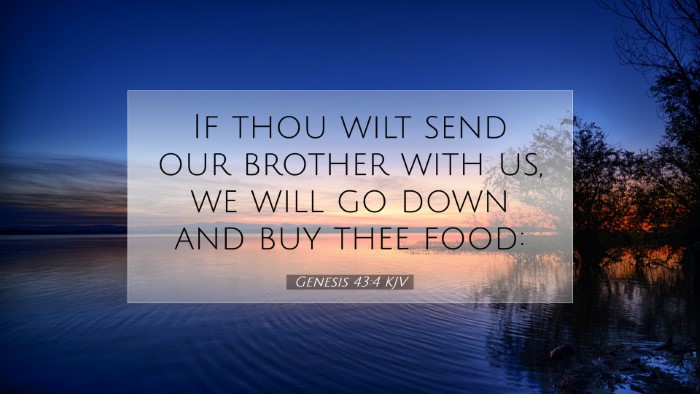Bible Commentary on Genesis 43:4
Text of Genesis 43:4 (NKJV): “If you send our brother with us, we will go down and buy you food.”
Introduction
This verse portrays a pivotal moment in the narrative of Joseph and his brothers. It encapsulates the urgency of their situation during a severe famine and the necessity of reconciliation and trust among the brothers. The plea made here by Judah signifies not just a request for action but a deeper relational dynamic that is unfolding. In this commentary, we draw insights from prominent public domain commentaries to elucidate the implications of this verse.
Contextual Background
The events leading up to Genesis 43:4 are critical to understanding its significance. The famine that struck the land was severe, affecting not only Egypt but also the regions surrounding it, including Canaan where Jacob and his family resided. The previous encounter with Joseph, where he demanded they bring Benjamin to prove their honesty, sets the stage for this urgent appeal.
Judah's Role
Judah becomes a significant figure in this episode. His suggestion to take Benjamin along acts as a culmination of his growth and responsibility. As Henry notes, “Judah offered himself as a surety for Benjamin,” highlighting his willingness to bear the consequences if anything should happen to the boy. This not only reflects Judah's character development since the selling of Joseph but also emphasizes the theme of sacrifice and redemption that permeates the story.
Insights from Commentaries
Matthew Henry's Commentary
Matthew Henry elaborates on the familial relationships and tensions at play. He denotes the struggle between Jacob’s fear of losing another son and the necessity of providing sustenance. He observes that Judah’s plea signifies “the importunity of brothers in distress” and that “in times of trouble, the families of God must unite.” Judah’s declaration shows his transformation from a selfish sibling to a caring protector, suggesting a deeper moral and ethical evolution of the children of Israel.
Albert Barnes’ Notes
Albert Barnes adds a practical perspective, emphasizing the economic realities faced by Jacob and his sons. He argues that the famine required urgent action that would not only ensure survival but also restore familial ties. Barnes notes, “The journey to Egypt signifies not only a physical trip but also a spiritual journey toward reconciliation.” Here, the act of sending Benjamin can be seen as the brothers confronting their past mistakes and seeking to amend them in the face of adversity.
Adam Clarke's Commentary
Adam Clarke offers a historical and cultural context, explaining the significance of brotherhood and familial loyalty in the ancient Near East. Clarke points out the prevailing customs related to family ties and how those patterns influenced the brothers’ dynamics. He notes, “In their plan to retrieve the situation, they reflect a deep reliance on each other that was previously absent.” The emphasis on sending Benjamin represents a commitment to unity and shared destiny, mirroring larger biblical themes of forgiveness and God’s providential care.
Theological Implications
Genesis 43:4 opens a rich vein of theological reflection. The passage challenges readers to consider themes of sacrifice, redemption, and the family of God. The decision to send Benjamin is fraught with risk, but it also represents hope and the possibility of restoration. In the broader narrative, this moment foreshadows the later reconciliation between Joseph and his brothers, which is emblematic of God’s desire to mend broken relationships.
Family Dynamics
The familial tensions present in this story resonate with contemporary issues of trust, betrayal, and reconciliation. The brothers’ journey to Egypt can serve as a metaphor for the Christian journey – confronting past failures and moving toward a future filled with hope. As noted by Henry, “The necessity of their situation forces them to confront their brotherhood and limits established by past grievances.”
God’s Sovereignty
This verse also reinforces the theme of divine providence. The sequence of events shows that what may seem like a perilous decision to Jacob turns into a part of God's larger narrative of salvation. Clarke encourages readers to perceive Joseph as a type of Christ: “Much like Joseph, who was wronged yet became a savior to his people, believers are called to embody grace and forgiveness.”
Practical Applications
- Importance of Trust: As students of the Scripture, one can glean insights about the importance of rebuilding trust in our relationships.
- Role of Sacrifice: This verse encourages believers to consider what they are willing to sacrifice for the well-being of others.
- Reconciliation: Just as Judah sought to reconcile with Jacob and ensure Benjamin's safety, we are reminded of our call to seek reconciliation in our own lives.
- Response to Crisis: In times of crisis, it is essential to act collectively and supportively, relying on each other as a community of faith.
Conclusion
Genesis 43:4 stands as a significant verse within the larger context of Joseph's narrative, brimming with themes of trust, sacrifice, and reconciliation. The insights offered by the esteemed commentaries of Matthew Henry, Albert Barnes, and Adam Clarke enrich our understanding of this text, enabling pastors, students, theologians, and scholars to draw deeper meanings applicable in their walks of faith. As we reflect on the actions and transformations depicted in this narrative, we are stirred to examine our relationships and consider how we might participate in God's redemptive work in our communities.


